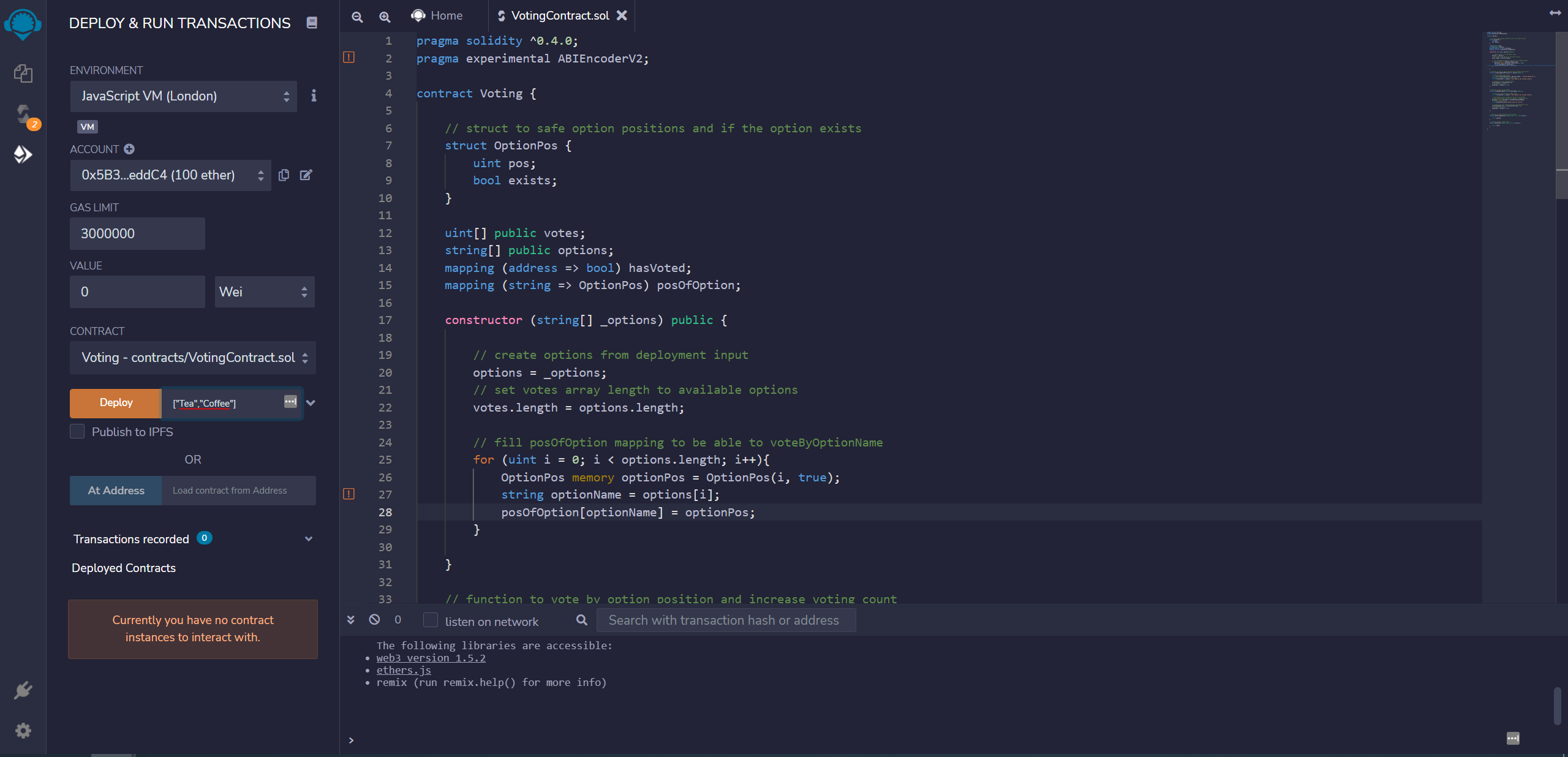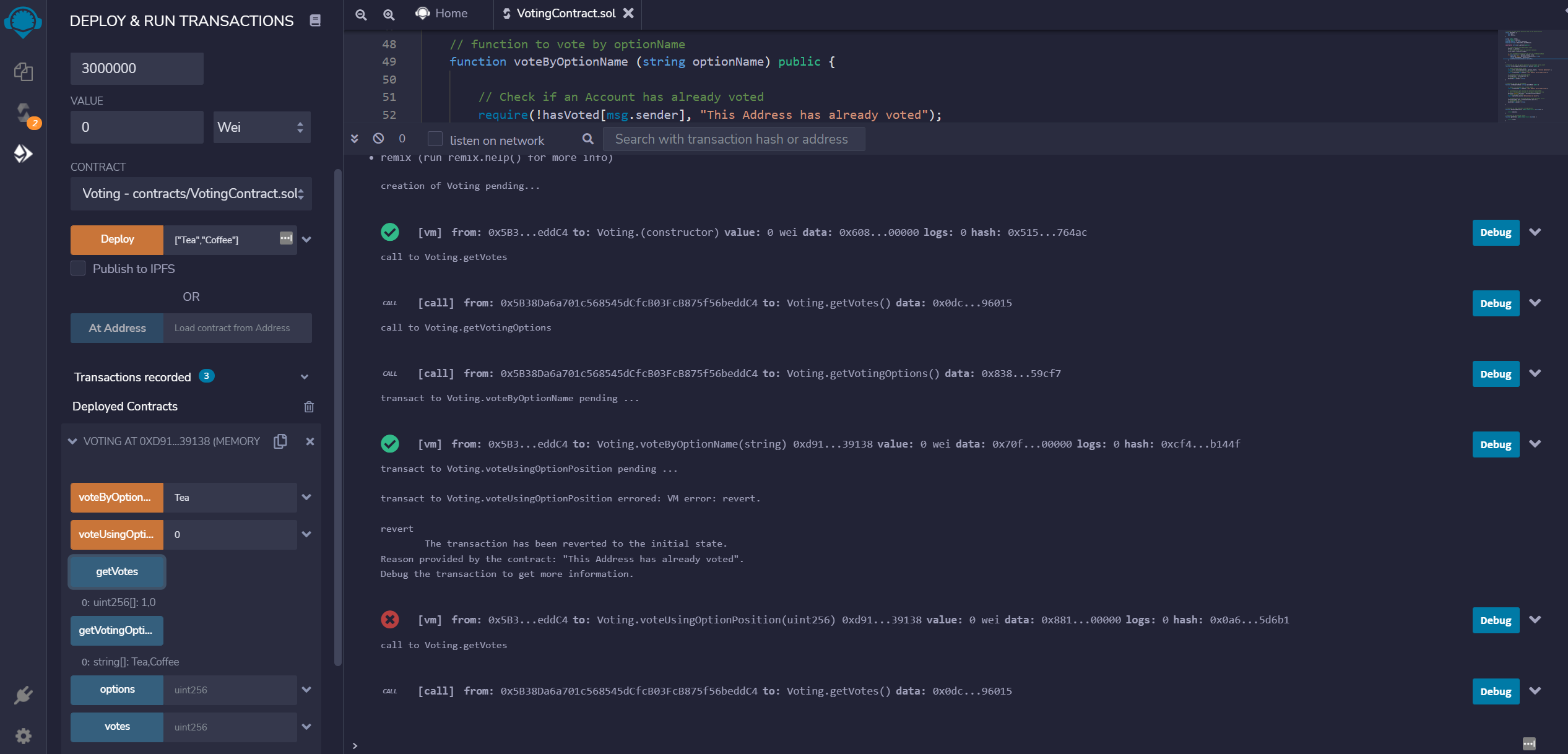This Tutorial shows how to write, deploy and interact with a ethereum voting smart contract
| Key | Value |
|---|---|
Source Code |
🕳️ Pluralsight - Ivan Mushketyk |
Tutorial Author |
☕ Julian Wendland |
$ETH Address |
0xB345BD9ff34DeFf59526DF03B0A41d5E7C54bC72 |
1. Download and install MetaMask wallet
2. Request Rinkeby testnetwork tokens for transaction fee
3. open Remix - Ethereum Web IDE:
4. Create Solidity Smart Contract file VotingContract.sol in Remix IDE
pragma solidity ^0.4.0;
pragma experimental ABIEncoderV2;
contract Voting {
// struct to safe option positions and if the option exists
struct OptionPos {
uint pos;
bool exists;
}
uint[] public votes;
string[] public options;
mapping (address => bool) hasVoted;
mapping (string => OptionPos) posOfOption;
constructor (string[] _options) public {
// create options from deployment input
options = _options;
// set votes array length to available options
votes.length = options.length;
// fill posOfOption mapping to be able to voteByOptionName
for (uint i = 0; i < options.length; i++){
OptionPos memory optionPos = OptionPos(i, true);
string optionName = options[i];
posOfOption[optionName] = optionPos;
}
}
// function to vote by option position and increase voting count
function voteUsingOptionPosition(uint option) public {
// Check allowed option value
require(0 <= option && option < options.length, "Invalid Operation" );
// Check if an Account has already voted
require(!hasVoted[msg.sender], "This Address has already voted");
// increase vote for selected option
votes[option] = votes[option] +1;
// set hasVoted to yes
hasVoted[msg.sender] = true;
}
// function to vote by optionName
function voteByOptionName (string optionName) public {
// Check if an Account has already voted
require(!hasVoted[msg.sender], "This Address has already voted");
// use mapping to get position of option by optionName
// Note: using memory instead of storage = cheaper gas fee
OptionPos memory optionPos = posOfOption[optionName];
// check if option exists
require(optionPos.exists,"Option does not exist");
// increase vote for selected option using optionPos struct
votes[optionPos.pos] = votes[optionPos.pos] + 1;
// set hasVoted to yes
hasVoted[msg.sender] = true;
}
// function to read available voting options
function getVotingOptions() public view returns (string[]) {
return options;
}
// function to get voting counts
function getVotes() public view returns (uint[]) {
return votes;
}
}
6. Deploy Voting Smart Contract to Ethereum Rinkeby testnetwork using ["Tea","Coffee"] for _options input variable
7. Interacting with the public smart contract functions voteByOptionName voteUsingOptionPosition
After deploying the smart contract we can call the function getVotes to see the initial result is 0,0.
Next step is to call the function getVotingOptions to see ["Tea","Coffee"] is set.
To vote for Coffee or Tea call the function voteByOptionName and choose between Tea or Coffee for optionName string parameter.
Trying to call the function voteUsingOptionPosition from the same account leads to the expected errormessage "This Address has already voted"
The last call of function getVotes shows as result 1,0 if you voted for Tea and 0,1 if you voted for Coffee.

